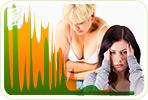The use of natural menopause treatments is a popular choice for managing unpleasant symptoms like hot flashes, night sweats, and depression. Many women decide to use natural or alternative treatments over traditional medication in order to cope with their symptoms.

Natural treatments are over-the-counter therapies, such as phytoestrogenic supplements, wild yams, and other herbal medicines. They may also include complementary therapies such as homeopathy, acupuncture, and traditional Chinese medicine.
Why Use Natural Treatments?

During menopause, the production of hormones such as estrogen, begins to slow down. As a result of the change in hormone levels, women can experience a variety of symptoms, ranging from simple aches and pains, forgetfulness, and depression to chest pain, hot flashes, and sleeping problems.
Quick Fact:
Many use complementary therapies and natural treatments in order to help manage their symptoms. Natural therapies, such as herbal teas, have therapeutic benefits in dealing with fatigue and low energy levels.
What Are the Different Natural Treatments?
Although a healthy body is the best treatment for menopause symptoms, there are a variety of natural treatments using herbs and vitamins. For example, black cohosh imitates the effects of estrogen and can be used as a natural treatment for hot flashes. Also, bioflavonoids are found mostly in citrus fruits and help to find relief from menopause symptoms.
Many vitamins found in healthy foods can be used as a natural menopause treatment, including:
Vitamin C. This vitamin is found in broccoli, cabbage, asparagus and tomatoes, and can help with urinary tract infections.
Vitamin E. It helps with vaginal dryness, and is found in asparagus, almonds, lamb, brown rice, and mangoes.
Vitamin B. This vitamin can help with emotional stress and mood swings, and is found in wheat germ or can be taken in supplements.
How Should I Approach Natural Menopause Treatments?

It can be difficult to discern which one the best choice is for you. While maintaining a healthy and balanced lifestyle is obviously vital, it doesn't tackle the root problem - hormonal imbalance. The best course of action is usually a combination of a healthy diet and additional alternative medicine.
Sources
- BMJ Group. "Menopause: What is it?" Patient Leaflet. 2007.
- Hopkins, Virginia. Lee, John R. M.D. What Your Doctor May Not Tell You About Menopause. New York: Warner Books Inc., 1996.
- Love, Susan M.D. Menopause and Hormone Book. New York: Three Rivers Press, 2003.
- Martin, Raquel. The Estrogen Alternative. Rochester, VT: Healing Arts Press, 2000.


